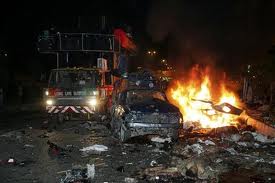
Over 33000 Improvised Explosive Device (IED) blasts have taken place in Pakistan in last decade and in these attacks more than 11000 people have been killed.
Islamabad, Feb 12/Nationalturk – According to Pakistani officials, more than 33000 Improvised Explosive Device (IED) blasts have taken place in the country in last decade and in these attacks over 11000 people have been killed.
According to an official statement quoted by Pakistan’s newspaper, Express Tribune, Pakistan is one of the top victims of IED explosions by militants and terrorists. “During the last decade, about 33150 IED explosions took place across Pakistan. In these blasts, 11250 people were killed and over 21000 injured, some of them critically”.
Pakistan army to raise new force to deal with IEDs
It said Pakistan Army plans to raise a new force to deal with the threat of IEDs. The IEDs have also been a major cause of fatalities among foreign forces stationed in neighbouring Afghanistan.
“An inter-agency meeting, held at the General Headquarters in Rawalpindi, was informed that a new force of three Counter IED units was being raised within the Pakistan Army,” an official statement said.
It said the meeting chaired by Chief of General Staff Lt General Rashad Mahmood, was part of efforts by the government to deal with the threat of IEDs.
“The officials reviewed challenges and threats posed by IEDs in the present environment and identified them as the ‘cheapest assassins’,” the statement said.
It quoted officials and experts as acknowledging that while the menace has been growing overall, the number of IEDs has been successfully reduced in conflict zones from 55% to 45% in the last couple of years.
“A regulatory mechanism was discussed in detail for the effective control of the movement of the explosive material and Calcium Ammonium Nitrate (CAN) fertiliser from regional and extra-regional countries,” the statement said.
According to the US, about 80% of the IEDs used in Afghanistan contain homemade explosives, and more than 80% of them are derived from the CAN fertiliser, which is produced in Pakistan.
Write your comments and thoughts below
Faiz Ahmad / NationalTurk Pakistan News
[adrotate banner=”46″]


